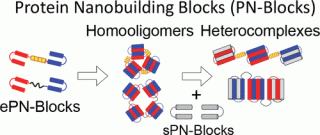Novel Artificial Protein Complexes Constructed from Protein Nanobuilding Blocks
- Share
- Tweet
- Send to email
A joint research team led by Dr. Ryoichi Arai, Head of the Department of Supramolecular Complexes in Research Center for Fungal and Microbial Dynamism, Shinshu University, and Dr. Naoya Kobayashi, Research fellow of Exploratory Research Center on Life and Living Systems, National Institutes of Natural Sciences, designed and created novel Protein Nanobuilding Blocks (ePN-Blocks: extender Protein Nanobuilding Blocks) which connected tandemly artificial proteins (WA20), and successfully produced chain-like protein complexes and supramolecular nanostructure complexes.
Proteins form various self-assembling complexes in vivo and are involved in complex life phenomena. The research team is working toward the development of unique artificial proteins to design functional protein complexes as desired.
Protein Nanobuilding Block (PN-Block) is a nanoscale building block composed of stable and simple artificial proteins developed for easy design and formation of nanostructures. Like a toy block, by creating and assembling the several types of basic PN-Blocks, various types of self-assembling nanostructure proteins are expected to be developed easily.
In order to realize this concept, the research team had achieved the structural analysis of stable and simple artificial de novo protein WA20 in 2012, and designed PN-Block self-assembled into multiple nanostructures in 2015.
In this study, ePN-Blocks, a new type of PN-Blocks, was developed by tandemly linking two of artificial proteins WA20, and constructed closed chain-like homooligomers. By reconstruction with different type of PN-Block, sPN-Block (stopper PN-Block), the oligomers dynamically transformed into open chain-like linear heterocomplexes, esPN-Blocks. Furthermore, supramolecular nanostructure complexes esPN-Blocks were successfully self-assembled by the addition of metal ion. It will be potentially capable of development of a new functional protein complex beyond natural proteins.
This study is the first step to regulate the design PN-Blocks and is expected to be a future application of bio-pharmaceuticals, green chemistry, and nanobiotechnology. As one of the cutting-edge molecular technologies from Japan, the PN-Block strategy will contribute to the further development in the field of nanotechnology and synthetic biology.
This study was published in the academic journal "ACS Synthetic Biology" on May 18th issued by American Chemical Society.
Reference:
Naoya Kobayashi, Kouichi Inano, Kenji Sasahara, Takaaki Sato, Keisuke Miyazawa, Takeshi Fukuma, Michael H Hecht, Chihong Song, Kazuyoshi Murata, and Ryoichi Arai, Self-assembling supramolecular nanostructures constructed from de novo extender protein nanobuilding blocks, ACS Synthetic Biology, 7, 1381–1394 (2018).
DOI: 10.1021/acssynbio.8b00007
URL: https://pubs.acs.org/doi/abs/10.1021/acssynbio.8b00007





